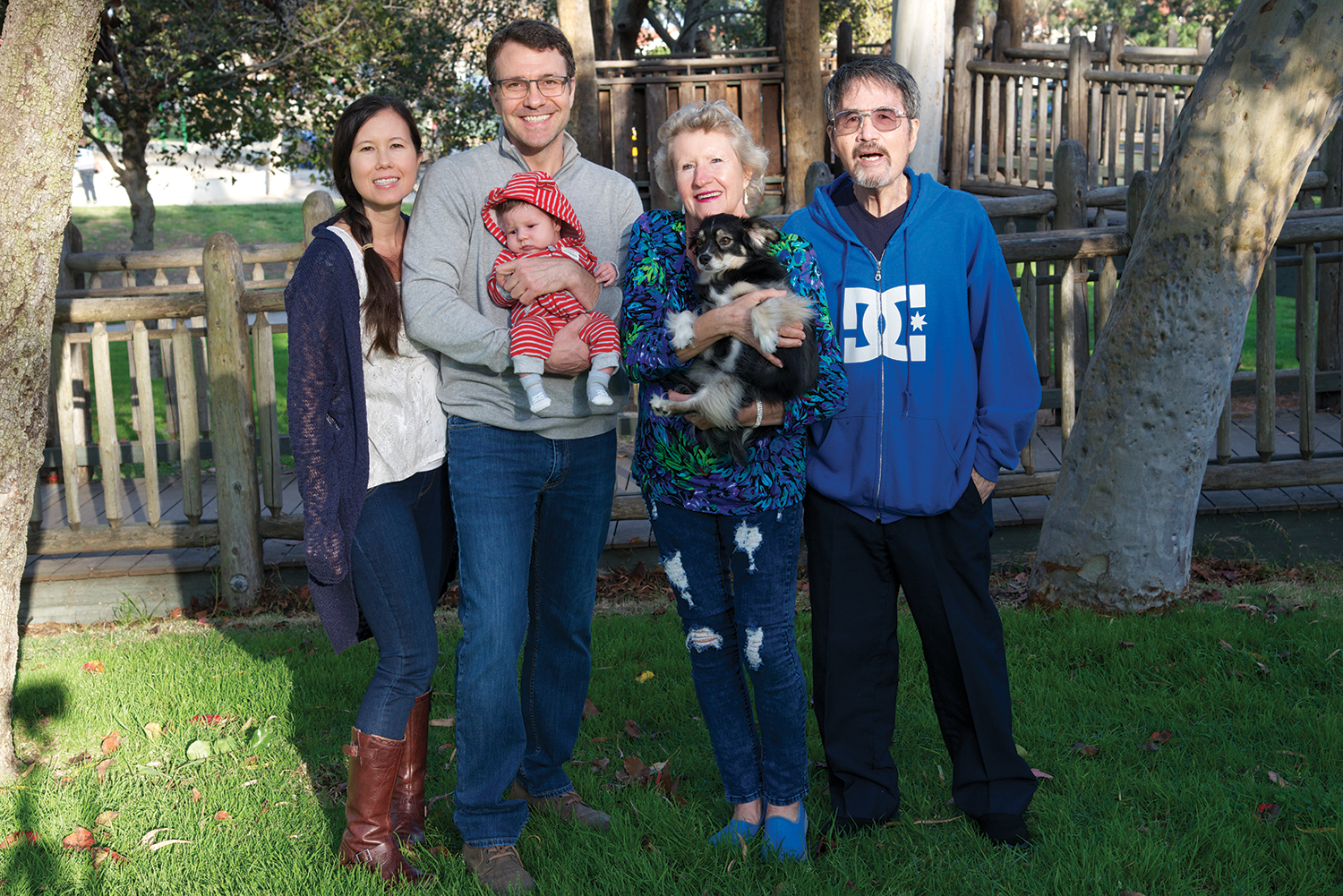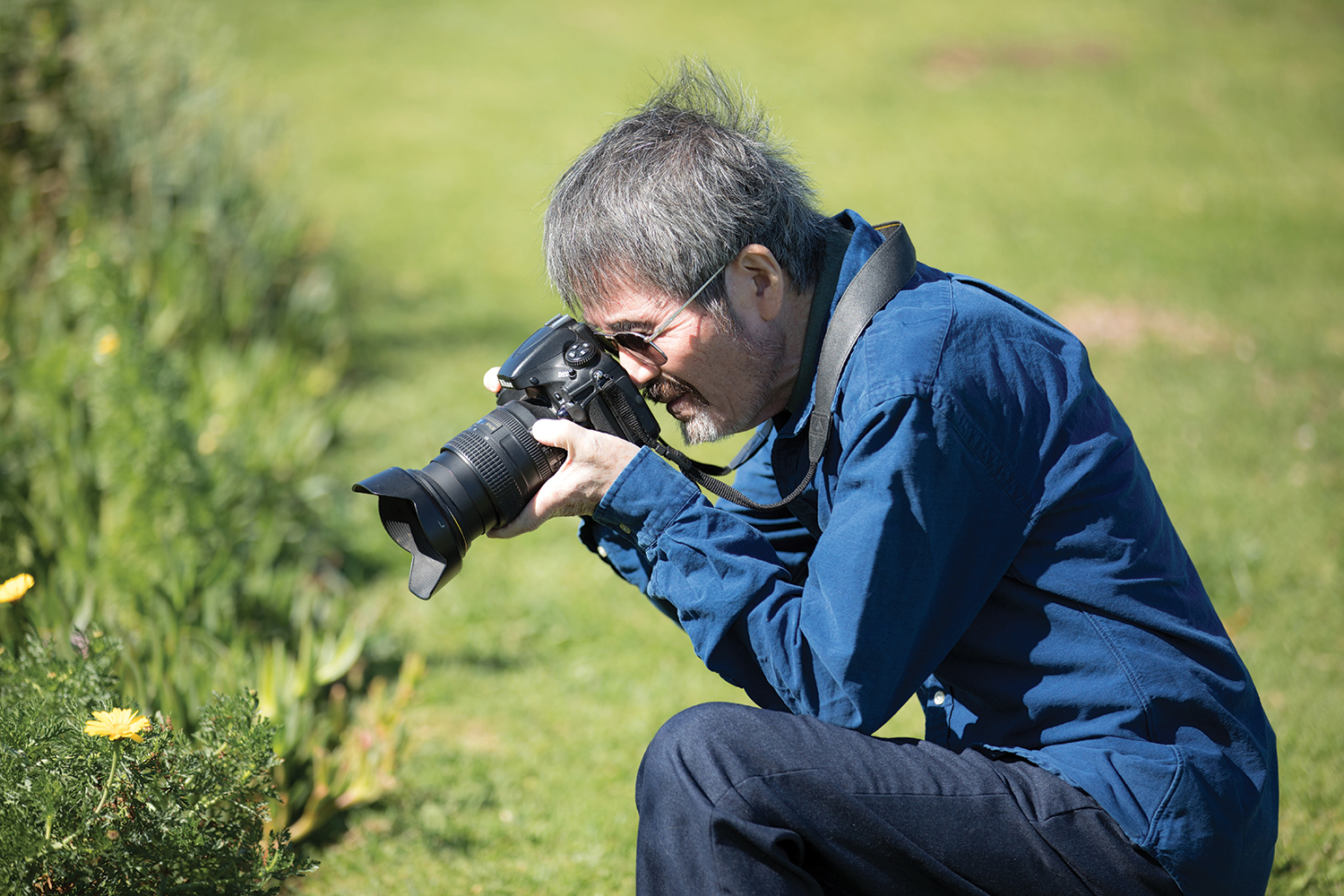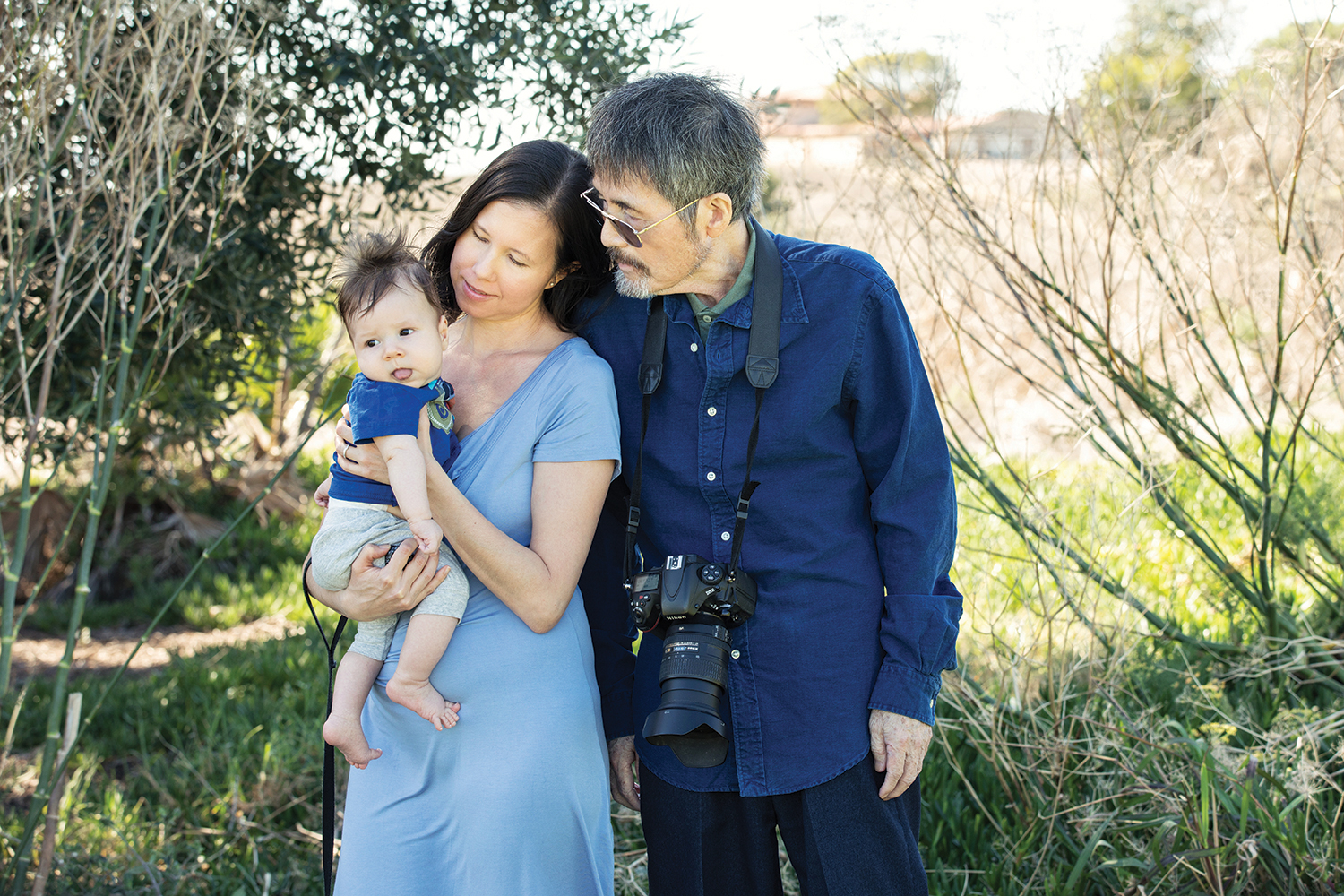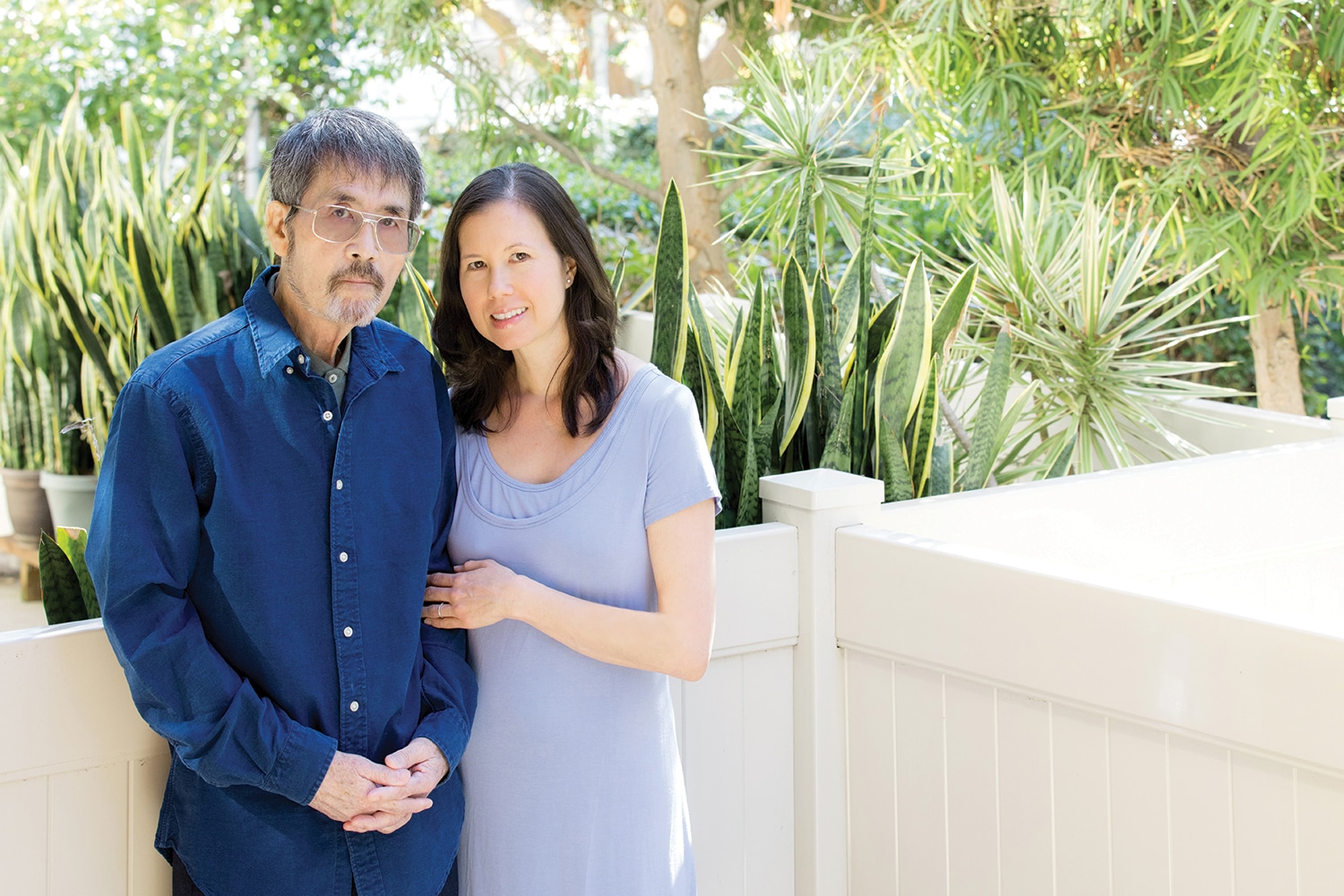At age 71, Shigeo Tsuruoka had never gone to a doctor’s office for a routine physical examination. But when he started having black stools in November 2013, he decided to seek medical attention.
Tsuruoka, who lives in Lomita, California, in the Los Angeles area, was anxious because his brother in Japan had died after being diagnosed with stomach cancer. Tsuruoka went to a local emergency room and was admitted to the hospital; he was relieved when the next day he was discharged with a diagnosis of diverticulosis, a benign condition in which pouches form in the colon wall.
In a phone call just before Thanksgiving, a gastroenterologist confirmed the benign diagnosis with Tsuruoka’s daughter, Aki Smith, then 32. She scheduled a follow-up primary care appointment for her dad. On the phone after the appointment, Smith recalls, her father “sounded weird.” She asked how his appointment went and he replied, “Not good.” She asked why. “I have cancer,” he said.
Smith raced out of her apartment, picked up her father and drove to the gastroenterologist’s office. In a private room, Smith says, the doctor confirmed that Tsuruoka had gastric adenocarcinoma, the most common type of stomach cancer. “I [was] very, very shocked,” Tsuruoka says.
It wasn’t until nearly four years later, in 2017, that Tsuruoka went to another doctor’s appointment without his daughter by his side.
Assembling a Dream Team
Tsuruoka was born in Tokyo in 1942, during World War II. One of seven children, he spent his late teens and his 20s working for Nikon repairing cameras in Japan, the U.S. and Europe. At 30, he went to college in Japan to study photography in hopes of becoming a professional photographer, but it turned out to be a “tough business,” he says. He returned to repairing cameras and moved to Paris to work. There, he met his future wife, Anna Mianowska, who had moved to France from Poland some years earlier.
Shigeo and Anna married in 1980 and moved that same year to Gardena, California, in the Los Angeles area, where Tsuruoka’s company had given him an opportunity to work. In 1981, Aki was born. Tsuruoka continued to work with cameras, including running his own business doing repair work mandated by camera warranties, until he retired in 2003.
English is Tsuruoka’s second language, after Japanese, and he often worked with Japanese clients during his career, he says, so he doesn’t feel entirely comfortable speaking English. Partly because of this, after Tsuruoka’s stomach cancer diagnosis, Smith took on the task of scheduling appointments, accompanying him to appointments, researching treatment options and keeping tabs on medical bills. At first, it seemed like every time the pair went to a new appointment, they left with a different treatment plan. There was uncertainty about the stage of Tsuruoka’s cancer. Doctors told him he would need to have his stomach removed, but he felt that he wasn’t getting a good explanation of how he could live without a stomach.
“My dad was so scared,” Smith says. “I was scared too. It didn’t seem like much of a life after removing his stomach. Now I know that’s not true.”

Shigeo Tsuruoka poses for a November 2017 family photo at a park in Torrance, California. His daughter, Aki Smith, stands with her husband, Tom Smith, who is holding their son, Kai Tomasz Smith. Shigeo’s wife, Anna Tsuruoka, holds Jake, the Smith family’s dog. Photo by Shigeo Tsuruoka
Tsuruoka called friends in Japan and the U.S. for advice, and one suggested that he seek a second opinion. Smith identified Zev Wainberg, an oncologist at the University of California, Los Angeles (UCLA), who was involved in gastrointestinal cancer research and clinical trials.
Smith and Tsuruoka met with Wainberg in December 2013, and he connected them with a UCLA gastric surgeon, Darryl Hiyama. Since the two doctors were not members of the medical group designated by Tsuruoka’s Medicare plan, Smith had to argue to get approval for him to see them. “My wife assembled the dream team to treat my father-in-law,” says Tom Smith, Aki’s husband.
Hiyama explained to Tsuruoka and Aki that the stomach functions as a holding chamber and a space to mechanically break down food and mix it with fluid. It is the small intestine that largely absorbs nutrients. If he did a total gastrectomy, removing Tsuruoka’s entire stomach, Hiyama said, he would attach Tsuruoka’s esophagus to his intestinal tract. Tsuruoka would need to eat smaller portions more often throughout the day and chew his food well, but he would still be able to eat. Tsuruoka felt more comfortable with his new doctors and opted to move his care to UCLA. “We decided Dr. Hiyama was captain of the boat,” Tsuruoka says.
Tsuruoka gave Hiyama permission to decide during surgery how much of his stomach to remove based on the size and location of the tumor. On Feb. 11, 2014, Hiyama performed a total gastrectomy. Tsuruoka’s 7.5-centimeter tumor was located in the bottom portion of his stomach and had grown through his stomach wall. Three of his lymph nodes were positive for cancer. His cancer was stage IIIB.
Finding a Target
An estimated 26,240 people will be diagnosed with stomach cancer in the U.S. in 2018, according to the American Cancer Society, and an estimated 10,800 people will die of the disease. While stomach cancer is not even among the top 10 leading causes of death from cancer in the U.S. today, it was the most common cause of cancer death in the U.S. until the late 1930s and remains the third leading cause of cancer death worldwide.
In Japan, gastric cancer rates are more than seven times higher than in the U.S. People who come to the U.S. after growing up in a higher-incidence country like Japan are at increased risk of stomach cancer. But second-generation Japanese-Americans appear to be at lower risk than their parents, indicating that environmental factors, like harboring the bacterium Helicobacter pylori—which Tsuruoka was positive for—and the amount of salty, preserved foods in one’s diet play a role in risk.
As an immigrant from Japan, Tsuruoka is in the higher-risk group, but he is also typical of a U.S. patient because he was diagnosed with stomach cancer that was no longer early-stage. Between 2007 and 2013, 27 percent of stomach cancers in the U.S. were localized at diagnosis, while 28 percent, as in Tsuruoka’s case, had spread to regional lymph nodes, and 35 percent had metastasized to distant sites. In Japan, where there is a screening program for stomach cancer, almost half of gastric cancers are diagnosed while they are still localized.
Outcomes for stomach cancer patients in Japan also tend to be better than in the U.S. One reason may be that many patients are diagnosed at an early stage. Hiyama says that Japanese surgeons also tend to remove more lymph nodes during surgery, with the theory that lymph nodes may harbor cancer cells and contribute to the high rate of early recurrences in locally advanced stomach cancers.

Stomach cancer survivor Shigeo Tsuruoka takes photos at one of his favorite spots, Friendship Park in San Pedro, California. Photo by Dawn Bowery
Hiyama was able to remove all of Tsuruoka’s visible tumor and 28 lymph nodes. After surgery, to try to further reduce his risk of recurrence, Tsuruoka received three months of chemotherapy with FOLFOX, a combination of folinic acid, fluorouracil and oxaliplatin, followed by five weeks of radiation therapy. Tsuruoka also learned after surgery that his tumor had elevated levels of the protein HER2.
The targeted therapy Herceptin (trastuzumab) was approved in 2010 for treatment of certain patients with metastatic stomach cancer who have elevated HER2. Tsuruoka’s cancer was not metastatic, but Wainberg recommended that he take Herceptin, which he did for a year. Herceptin is currently being studied for use in patients with stage III stomach cancer.
After surgery, Tsuruoka says, he did not feel too bad. About a week after the gastrectomy, while still in the hospital, he ordered his first meal of solid food—pancakes, sausage and eggs. On March 29, 2014, after one cycle of chemotherapy, Tsuruoka celebrated his 72nd birthday, which had been on March 4, by accompanying his family and friends to watch the horses race in the Tokyo City Cup at Santa Anita Park in nearby Arcadia, California. Going to the track has been a favorite pastime for Tsuruoka since he was a young man in Japan. “He ate a lot,” Smith says. Around that time, he also went out with his camera to do nature photography.
But soon after that, Tsuruoka’s condition began to deteriorate. He developed dental problems, including teeth that broke in two. Because he was immunocompromised from chemotherapy, he was instructed not to get dental work. He had trouble chewing because of the discomfort, and food smelled different than usual to him because of the chemotherapy. Before he started treatment, he weighed 151 pounds. At his lowest point, he weighed 97 pounds, underweight for his height of 5 feet 7 inches.
As Tsuruoka got sicker, Smith began to question her role in helping him pursue such aggressive treatment. “My dad was the ultimate decision maker, but a lot of times he’d look to me for guidance,” she says.
Tsuruoka got dental work after finishing chemotherapy and before starting radiation. But he continued to struggle to eat and spent much of his time in bed. “He didn’t have the energy to do photography or the strength to pick up a camera, because his camera is like 5 pounds,” Smith says. “It was really a bad time for us. For me, it felt like, ‘Why did we do all this if he’s not able to enjoy his life?’”
Back to Life
As Tsuruoka’s treatment wound down, he and Smith embarked on their next challenge: developing a plan for survivorship care. As soon as Medicare open enrollment began, Smith’s first step was to adjust her father’s plan so that Hiyama and Wainberg were part of his assigned medical group.

Aki Smith holds her son, Kai Tomasz Smith, while new grandfather Shigeo Tsuruoka looks on. Kai was born in October 2017. Photo by Dawn Bowery
Smith and Tsuruoka, with the help of Tsuruoka’s new primary care doctor, found him a series of specialists to help manage the long-term side effects of his treatment. Physical therapy helped Tsuruoka to rebuild muscle he had lost during his rapid weight loss. At the UCLA Center for East-West Medicine, Tsuruoka received acupuncture. He also started seeing a digestive health dietitian at UCLA, Nancee Jaffe, to help him better adjust to life without a stomach.
Tsuruoka had muscle wasting, Jaffe says, and he needed to find a way to add more protein to his diet. At first, Jaffe recommended protein shakes, but Tsuruoka did not like them. Once she learned that he often ate rice for breakfast, she recommended that he add soybean paste and fish on top for added protein. “If it’s not pleasurable and it doesn’t fit his current lifestyle, it’s not going to work,” says Jaffe.
Tsuruoka continues to see Jaffe. At one point, his weight reached 122 pounds, within the normal weight range, although in late 2017 he started to lose weight again, for reasons he and his medical team are investigating.
Tsuruoka receives periodic CT scans and endoscopies to monitor for recurrence and continues to visit Wainberg and Hiyama. “He’s a lucky man in some ways,” says Wainberg. “He’s got a good attitude, and his family has been obviously very interested and engaged in helping gastric cancer patients.”
Paying It Forward
When Tsuruoka was diagnosed with stomach cancer in late 2013, Aki and Tom were in the process of closing a business they had started together. As Tom moved on to another startup company, they decided that Aki would take a break from working so she could care for Tsuruoka.
But as Tsuruoka’s health improved, Smith began to think about how she wanted to spend her time going forward. In early 2014, she had started blogging about her dad’s treatment to give updates to friends and family. Through blogging and social media, she had connected with other stomach cancer patients and caregivers. “I made the decision that if my dad survived this, I would pay it forward and help other people,” she says. In January 2016, she founded the nonprofit organization Hope for Stomach Cancer.
Smith’s goals are to promote stomach cancer prevention and early detection and to point patients and caregivers to resources on treatment, precision medicine, life after gastrectomy and other topics relevant to day-to-day life. “Aki has served as a one-person patient navigator for a cohort of patients,” says Samuel J. Klempner, a gastrointestinal medical oncologist at the Angeles Clinic and Research Institute and Cedars-Sinai Medical Center in Los Angeles who advises Smith on her nonprofit. Smith also attends conferences to stay informed about stomach cancer research. She has gone to several American Society of Clinical Oncology gatherings and attended the American Association for Cancer Research (AACR) Annual Meeting 2017 as part of the Scientist↔Survivor Program. (The AACR publishes Cancer Today.)
Tsuruoka has also been involved in patient advocacy. In March 2015, he traveled with Smith to Washington, D.C., to push for funding for stomach cancer research through the Debbie’s Dream Foundation, a nonprofit organization that advocates for stomach cancer awareness and funding. In the early days after his treatment, he also started corresponding with fellow stomach cancer patients. A photo he took of a hummingbird hovering near a flower was included in the 2017 calendar put out by the Conquer Cancer Foundation.
Tsuruoka is quick to say, “My story is not so important,” despite his willingness to share it if it helps others. But Smith says that the hours she has spent with her dad in the car and at medical appointments have deepened her appreciation of him. “As hard as what he went through [was], he had so much courage and strength,” she says. “Even if he didn’t make it, I’d still be so proud. He wants to live, and he took a lot of risks without a guarantee.”
Cancer Today magazine is free to cancer patients, survivors and caregivers who live in the U.S. Subscribe here to receive four issues per year.





